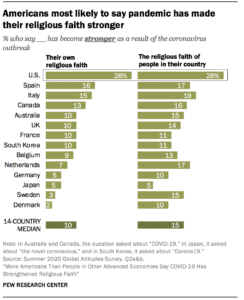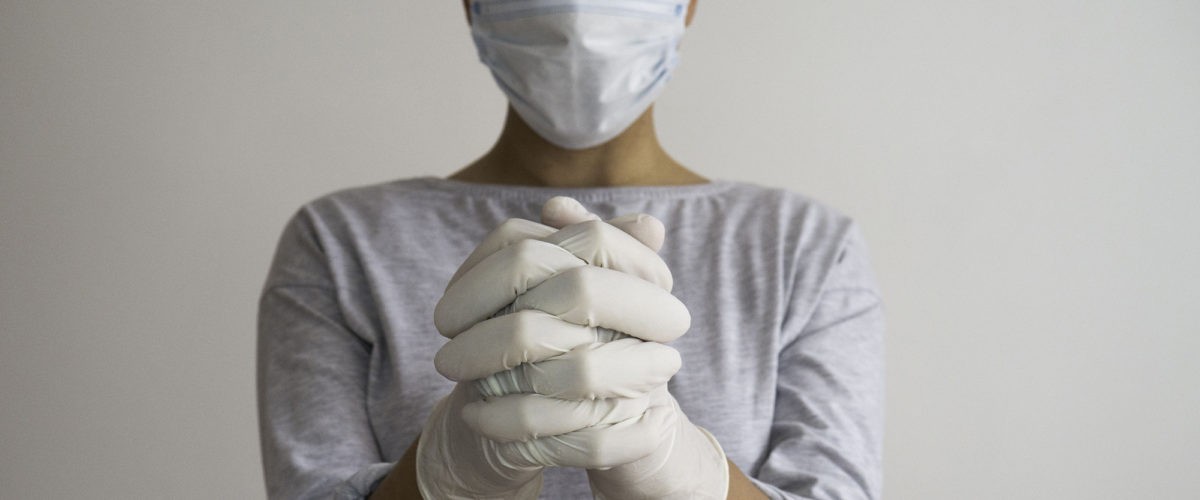A majority of Americans (68%) say the COVID-19 pandemic has had little effect on their religious faith, and just 4% say it has weakened their belief.
But the 28% who report the coronavirus outbreak has strengthened faith far outstrip populations in 13 other economically developed nations, the Pew Research Center reported.
By comparison, only 16% of Spaniards, 15% of Italians and 13% of Canadians described a deepened faith as a result of the global health crisis. Next in line were Australia, the UK, France and South Korea, all at 10%.
 Among Americans who participated in the survey, white evangelicals were found to be the most likely, at 49%, to say their faith was strengthened during the outbreak.
Among Americans who participated in the survey, white evangelicals were found to be the most likely, at 49%, to say their faith was strengthened during the outbreak.
“Three-in-ten U.S. Catholics say Americans’ religious faith has strengthened, while roughly a third report that their own religious faith has become stronger,” Pew said in a summary of the research. “Non-evangelical (mainline) Protestants show a similar pattern: Roughly two-in-ten say their own faith has deepened, while another 21% offer a similar assessment of other Americans’ religious faith.”
For context, Pew compared the overall findings of the survey it released Jan. 27 with a 2012 study that sought to observe the relationship between religious observance and catastrophic events. Taken after a massive earthquake in New Zealand in 2011, that survey revealed that “religious faith increased among the earthquake-affected, despite an overall decline in religious faith elsewhere.”
Pew also pointed to its October 2020 study in which 85% of Americans said they believe the pandemic has lessons for humanity. The same survey found that 35% believe the virus was sent by God.
The research group also raised the possibility that the gap between the United States and other nations may result from different understandings of the role of public and private religion.
“European countries experienced rapid secularization starting in the 19th century, and today comparatively few people in Italy (25%), the Netherlands (17%) or Sweden (9%) say that religion is very important in their lives. East Asian countries such as Japan and South Korea have low rates of religious affiliation and observance — at least by Western-centric measures,” Pew said in its January survey.
In its 2019 research into secularization trends, Pew found a 12 percentage-point decline in Americans who identified themselves as Christians during the preceding decade. It added that “Protestantism and Catholicism are experiencing losses of population share. Currently, 43% of U.S. adults identify with Protestantism, down from 51% in 2009. And one-in-five adults (20%) are Catholic, down from 23% in 2009. Meanwhile, all subsets of the religiously unaffiliated population — a group also known as religious ‘nones’ — have seen their numbers swell.”
“Religion continues to play a stronger role in American life than in many other economically developed countries.”
The new survey on COVID-19 and faith demonstrates that “religion continues to play a stronger role in American life than in many other economically developed countries. For example, nearly half of Americans (49%) say religion is very important in their lives, compared with 20% in Australia, 17% in South Korea and just 9% in Japan.”
But Pew also uncovered evidence of spiritual vitality among religious individuals in several other nations.
Among individuals to whom religion is “very important,” 49% of Spaniards, 45% of Americans, 44% of Italians and 40% of Canadians responded that their faith had become stronger as a result of the pandemic.
“Perceptions about the pandemic’s influence on faith are tied to people’s own levels of observance — those who are more religious are more likely than their less religious compatriots to say COVID-19 has strengthened their faith and that of others in their country,” Pew explained.
Responses also varied by wealth and education levels.
“When it comes to income, the largest gaps appear in the U.S. and Spain, where people at or below the national median income are 12 percentage points more likely than the rest of the population to say their religious faith has become stronger,” researchers said. “People with less education are significantly more likely than those with a secondary education or higher to say their personal religious faith has deepened in five of the countries surveyed.”
But Pew also noted that, overall, a majority of the populations surveyed see no real change in religiosity as a result of the coronavirus outbreak.
“In 11 of 14 countries surveyed, the share who say their religious faith has strengthened is higher than the share who say it has weakened. But generally, people in developed countries don’t see much change in their own religious faith as a result of the pandemic.”


